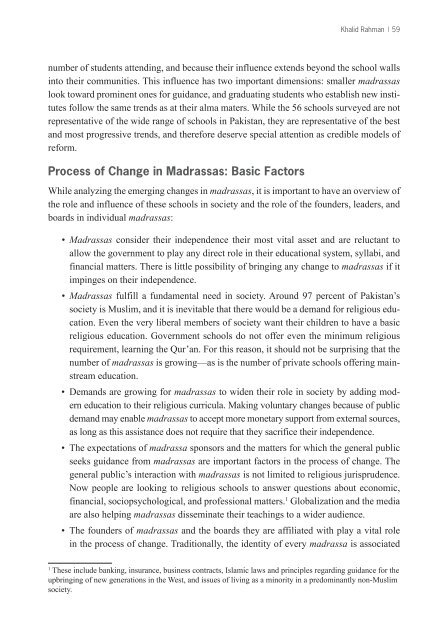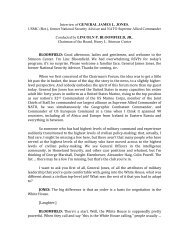Islam and Politics - The Stimson Center
Islam and Politics - The Stimson Center
Islam and Politics - The Stimson Center
Create successful ePaper yourself
Turn your PDF publications into a flip-book with our unique Google optimized e-Paper software.
Khalid Rahman | 59<br />
number of students attending, <strong>and</strong> because their influence extends beyond the school walls<br />
into their communities. This influence has two important dimensions: smaller madrassas<br />
look toward prominent ones for guidance, <strong>and</strong> graduating students who establish new institutes<br />
follow the same trends as at their alma maters. While the 56 schools surveyed are not<br />
representative of the wide range of schools in Pakistan, they are representative of the best<br />
<strong>and</strong> most progressive trends, <strong>and</strong> therefore deserve special attention as credible models of<br />
reform.<br />
Process of Change in Madrassas: Basic Factors<br />
While analyzing the emerging changes in madrassas, it is important to have an overview of<br />
the role <strong>and</strong> influence of these schools in society <strong>and</strong> the role of the founders, leaders, <strong>and</strong><br />
boards in individual madrassas:<br />
• Madrassas consider their independence their most vital asset <strong>and</strong> are reluctant to<br />
allow the government to play any direct role in their educational system, syllabi, <strong>and</strong><br />
financial matters. <strong>The</strong>re is little possibility of bringing any change to madrassas if it<br />
impinges on their independence.<br />
• Madrassas fulfill a fundamental need in society. Around 97 percent of Pakistan’s<br />
society is Muslim, <strong>and</strong> it is inevitable that there would be a dem<strong>and</strong> for religious education.<br />
Even the very liberal members of society want their children to have a basic<br />
religious education. Government schools do not offer even the minimum religious<br />
requirement, learning the Qur’an. For this reason, it should not be surprising that the<br />
number of madrassas is growing—as is the number of private schools offering mainstream<br />
education.<br />
• Dem<strong>and</strong>s are growing for madrassas to widen their role in society by adding modern<br />
education to their religious curricula. Making voluntary changes because of public<br />
dem<strong>and</strong> may enable madrassas to accept more monetary support from external sources,<br />
as long as this assistance does not require that they sacrifice their independence.<br />
• <strong>The</strong> expectations of madrassa sponsors <strong>and</strong> the matters for which the general public<br />
seeks guidance from madrassas are important factors in the process of change. <strong>The</strong><br />
general public’s interaction with madrassas is not limited to religious jurisprudence.<br />
Now people are looking to religious schools to answer questions about economic,<br />
financial, sociopsychological, <strong>and</strong> professional matters. 1 Globalization <strong>and</strong> the media<br />
are also helping madrassas disseminate their teachings to a wider audience.<br />
• <strong>The</strong> founders of madrassas <strong>and</strong> the boards they are affiliated with play a vital role<br />
in the process of change. Traditionally, the identity of every madrassa is associated<br />
1<br />
<strong>The</strong>se include banking, insurance, business contracts, <strong>Islam</strong>ic laws <strong>and</strong> principles regarding guidance for the<br />
upbringing of new generations in the West, <strong>and</strong> issues of living as a minority in a predominantly non-Muslim<br />
society.

















